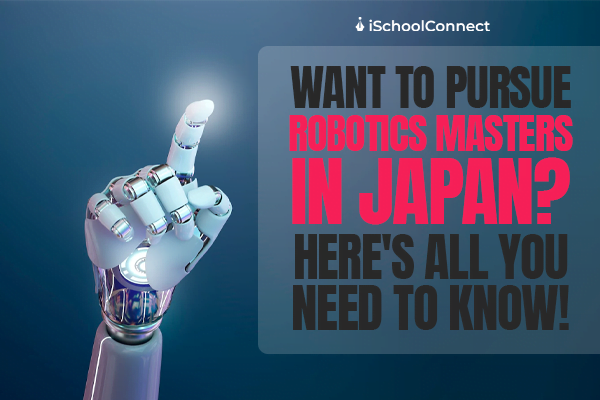Table of Contents
Robotics is a subfield of computer science and engineering that focuses on creating, maintaining, and using robots. Robots are automated machines that can help people in various situations, such as manufacturing processes and working in hazardous environments that are unsuitable for people. Robotics experts seek to accomplish multiple tasks by creating mechanical devices capable of completing them deftly. Computer science, character animation, machine design, cognitive science, and bio-mechanics are some of the science subfields to which robotics is related. Robotics is divided into several main categories: android science, artificial intelligence, nano-robotics, and robot surgery. Continue reading this blog to learn all about Robotics Masters in Japan.
Why study Robotics Master’s in Japan?

- Japan is one of the world’s leading robotics industries.
- The country has a long history of robotics research.
- The country has strong research networks in universities and industries.
- Japanese universities have high standards for education, with good facilities and quality teaching staff.
- They also provide good career services for students after graduation, including internships at top companies like Toyota or Panasonic.
Robotics Master’s in Japan – prerequisites and application process.
To apply for your robotics master’s in Japan, you must research the best schools. It would help if you looked at their requirements and the number of students they accept each year. You may also want to see if they have a rolling admissions process so that you can apply early or late, depending on when you get your TOEFL/IELTS scores back. Make sure you do not wait too long after applying because some programs will only accept students once they have finished their bachelor’s degrees or passed specific exams like the Graduate Record Examinations (GRE).
Robotics Master’s in Japan – cost.
Tuition fees range from $15,000 to $25,000. If you are an international student, the fees can be as high as $40,000 per year for Japanese citizens and permanent residents.
Living expenses are also expensive in Japan due to the high cost of living (rent and utilities). Still, if you manage your expenses carefully enough, it should work out to about 30 percent of your total annual income. If you plan on studying abroad as an international student rather than a local Japanese citizen, then keep in mind that tuition fees may vary depending on whether or not there’s a scholarship available for students like yourself.
However, if you cannot get financial aid through scholarships or other methods such as loans, this could become exceptionally prohibitively expensive.
Robotics Master’s in Japan: funding opportunities.

As with all Master’s degrees, several funding opportunities are available to students who want to pursue a master’s in robotics.
For one, you can apply for scholarships and grants. Some universities offer scholarships that cover up to 70% of your tuition fees, while others provide grants worth up to 5 million yen (roughly US$50k).
Various companies or organizations may offer several bursaries for international students who wish to study abroad in Japan. These programs usually require you to have excellent grades during undergraduate studies or a certain amount of work experience before applying for them. If you’re interested in this program but do not have time or money left over after completing your degree, look into these options.
Robotics Master’s in Japan: the job market.
For starters, many people are looking for jobs as robotics engineers—far more than there are positions available. This means that applicants must compete against each other based on their skills, quality, experience, and personal connections with recruiters or employers.
And because there aren’t enough jobs for everyone interested in entering the field, companies tend to hire only those with relevant experience or advanced degrees (Master’s degrees) at their disposal. This leaves new graduates without any previous work experience in the cold when it comes time for hiring decisions; however, if all goes well, these individuals may still be able to find employment after proving themselves during internships or apprenticeships (with companies like Honda).
As the job market is highly specialized, it is not easy to find a job without experience. Therefore, if you want to get a high-paying job straight after graduation, choosing a master’s degree in robotics from a top Japanese university would be better. The most famous universities include the University of Tokyo and Kyoto University. Each year, there are about 200 students who apply for the Master’s degree programs in robotics at these universities.
Read more: Automation in Education
Key takeaways
- Thanks to highly competitive research, development, and applied technologies, Japan is currently the world leader in robotics.
- Robotic advancement can completely revolutionize Japanese civilization.
- The Master’s degree in robotics from top Japanese universities may help you land a high-paying job directly after graduation.
Did you find this blog informative? If so, please express your thoughts in the comments below. Click here to contact us for more information. We would be happy to assist you with your queries.
Liked this blog? Read next: What does robotic process automation entail?
FAQs
Q1. Why is Japan so strong at robotics?
Ans. Because of its highly competitive research, development, and applied technologies, Japan is now booming in the robotics industry.
Q2. Are robotics studies in Japan a good idea?
Ans. Japan is the global leader in robotics thanks to its cutting-edge applied technologies and highly competitive research and development.
Q3. What role do robots play in the Japanese economy?
Ans. According to Japanese studies on the service sector, robots have helped to reduce turnover issues among long-term care workers and increased some employment opportunities. Experts think robots could help with problems with the ageing population and those working in the care industry.






